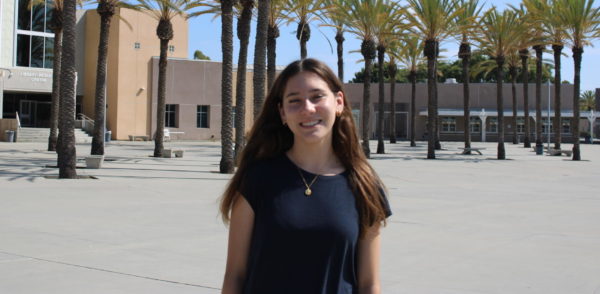From the comfort of her very own backyard, Fotini Troulis (11), alongside her family, has been cultivating a garden of vegetables, fruits, and flowers since 2013. Growing summer and spring produce, such as tomatoes, lettuce, and radish, as well as winter produce like broccoli and citrus, Troulis has found that there’s never a lack of freshness at her fingertips. In order to cultivate produce each season, her family has a secret to their green thumbs: compost made from their kitchen scraps.
“I think [composting] is definitely very beneficial if you have plants and a big garden and you don’t want to buy fertilizers that you don’t know what’s in it,” Troulis said. “It’s also a good way to not waste.”
To start the process, Troulis and her family sort out compostable material from their food scraps into a small bin in their kitchen.
“Whenever we use any raw fruits and vegetables, like peels or just any part of the produce that we don’t use, we put it in the bin,” she said.
According to Troulis, only things such as rinds, seeds, peels, and other organic remains are acceptable in a compost mixture. From the small bin in her kitchen, she combines it with the contents of a larger bin at the side of her house.
“We dump [the mixture] in, and then we put dry leaves in, which we collect in the fall time,” she said. “Then in the soil of your plants, you put alternating layers of compost and leaves.”
Troulis found that the combination of raw produce scraps and dry leaves added an important component to the process.
“To make good compost, you need nitrogen and carbon, so the nitrogen comes from the peels of the fruits, and the carbon comes from dry leaves,” she said.
After letting the mixture of leaves and produce scraps sit for a couple of months, it is necessary to sift through the mixture. Using a homemade large wooden frame with metal grids, the Troulis family finds it necessary to sift out rocks and non decomposed food to make it suitable for her plants.
“[Sifting] is just to make it thinner and to take out the big chunks of dirt so it can dry out quicker,” she said.
After filtering out the blend of food scraps and leaves, Troulis and her family incorporate the compost mixture into their plants by sprinkling it over the soil.
“If one of our plants is drying out, we put some combination [of compost and soil] in and then it helps it grow better,” she said. “Or just from the beginning, if we want to plant something new, I just add the combination to the soil.”
Troulis has discovered that there are some challenges, such as the smell, that come with composting. To combat this, she and her family have constructed ways to lessen its impact.
“It does kind of smell bad and it attracts flies but we keep a lid on it to try to minimize that,” she said. “Also, we keep [the bin] at the side of our house, so you don’t smell it.”
However, Troulis said that the challenges arising from composting are far outweighed by the benefits. The nitrogen and carbon compounds in the compost material allow the Troulis family to have both a heartier and tastier harvest.
“[Compost] fertilizes the soil without needing to use any unnatural products or fertilizers,” she said. “It just helps the plant get stronger and grow faster.”
This season, Troulis found that the tomatoes she’d grown were particularly bigger and sweeter compared to tomatoes found at the grocery store, due to the rich nutrients that the compost provided.
The process of making her own compost, Troulis said, was equally rewarding and interesting to learn about.
“It’s definitely worth it if you plan on having a garden in the future or just if you want organic produce from your harvest with no pesticides,” she said.
Although dealing with the smell and mess of old food can be a struggle, Troulis is hopeful that composting is and will be a helpful tool in growing the size and quality of the fresh produce in her garden and that her story will motivate others to do the same.






